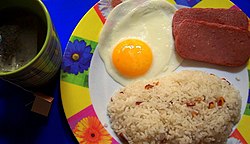Sinangag
 | |
| Alternative names | Garlic fried rice, garlic rice, Filipino fried rice, Philippine fried rice |
|---|---|
| Course | Main course |
| Place of origin | Philippines |
| Region or state | Philippines, also popular in Indonesia, Malaysia and Singapore |
| Created by | Filipino cuisine |
| Main ingredients | Fried rice in oil with a lot of garlic |
| Variations | Aligue rice, Bagoong fried rice |
Sinangág, also called garlic fried rice or garlic rice, is a Filipino fried rice dish cooked by stir-frying pre-cooked rice with garlic. The rice used is preferably stale, usually leftover cooked rice from the previous day, as it results in rice that is slightly fermented and firmer. It is garnished with toasted garlic, rock salt, black pepper and sometimes chopped scallions. The rice grains are ideally loose and not stuck together.[1][2][3][4][5]
It is rarely eaten on its own, but is usually paired with sinigang, a "dry" meat dish like tocino, longganisa, tapa, or spam, as well as daing (dried fish) and scrambled or fried eggs. Unlike other types of fried rice, it doesn't normally use ingredients other than garlic, so it doesn't overwhelm the flavour of the main dish.[1][2][4][5] In the Visayas regions of the Philippines, sinangág was traditionally seasoned with asín tibuok.[6]
Sinangág is a common part of a traditional Filipino breakfast and it usually prepared with leftover rice from the dinner before. Sometimes, it is cooked in the leftover sauces and oils from Philippine adobo. This lessens food waste. Preparing sinangág from freshly-cooked rice is frowned upon in Filipino culture. It is one of the components of the tapsilog breakfast and its derivatives.[1][2][3][4][5]
See also
- Aligue fried rice
- Bagoong fried rice
- Fried rice
- Kiampong
- Kuning
- Sinigapuna
- Cuisine of the Philippines
- List of fried rice dishes
References
- ^ a b c Cabrera, Maryanne. "Sinangag Filipino Garlic Fried Rice". The Little Epicurean. Retrieved 20 January 2019.
- ^ a b c Vanjo Merano. "Sinangag Recipe". Panlasang Pinoy. Retrieved 8 December 2014.
- ^ a b "Sinangag". Kawaling Pinoy. Retrieved 20 January 2019.
- ^ a b c "Garlic Fried Rice (Sinangag) - How to Cook". Filipino Food Recipes. Retrieved 20 January 2019.
- ^ a b c "Recipe #21: SINANGAG (Garlic Fried Rice)". Luto ni Lola. Retrieved 20 January 2019.
- ^ "Tultul "Rock" salt from Guimaras". Flavours of Iloilo. Retrieved 19 December 2018.

